Jen Gilroy's Blog, page 13
May 28, 2020
For the love of libraries
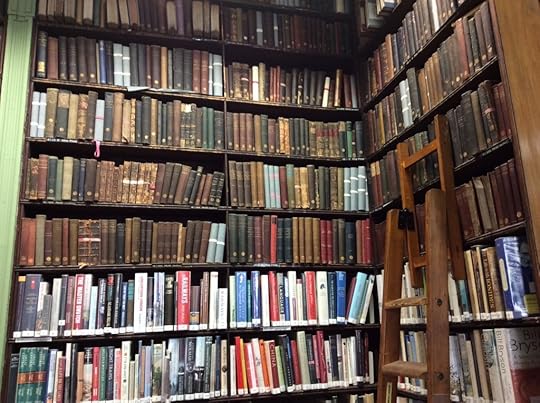 As both reader and author, one of the things I’ve missed most during this time of self-isolation is visiting the library.
As both reader and author, one of the things I’ve missed most during this time of self-isolation is visiting the library.
From childhood until now, libraries have been one of my happy places—to learn, get book recommendations, find a sense of community and more.
Learning about the world
One of my favourite childhood memories is of going to the library, first with my mother and then, as I grew older, by myself.
Throughout childhood and adolescence, the books I checked out from that little neighbourhood library were my passport to new places, people, and ways of seeing the world (both real and imaginary) without ever leaving home.
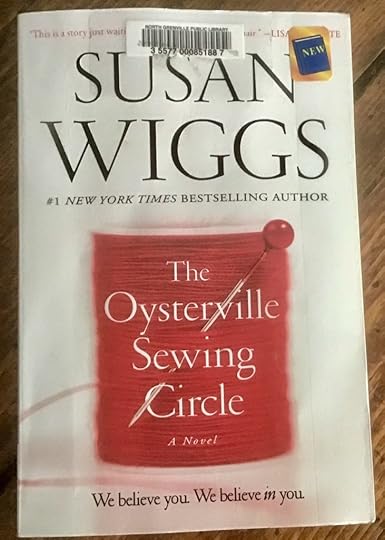 That’s still true today and thanks to books I borrowed just before my current small-town library closed for lockdown, from my sofa I’ve visited New York City and coastal Washington state (in The Oysterville Sewing Circle by Susan Wiggs), as well as France in the Second World War and a rural Irish village.
That’s still true today and thanks to books I borrowed just before my current small-town library closed for lockdown, from my sofa I’ve visited New York City and coastal Washington state (in The Oysterville Sewing Circle by Susan Wiggs), as well as France in the Second World War and a rural Irish village.
Book recommendations, reader connections and more
Libraries offer book recommendations too. One of the things I value about my local library is the “staff picks” section and books showcased at the circulation desk that relate to a special event or something book or author-related in the news.
Not only have those recommendations helped me discover new authors, they’ve also led to book chat with library staff and other patrons.
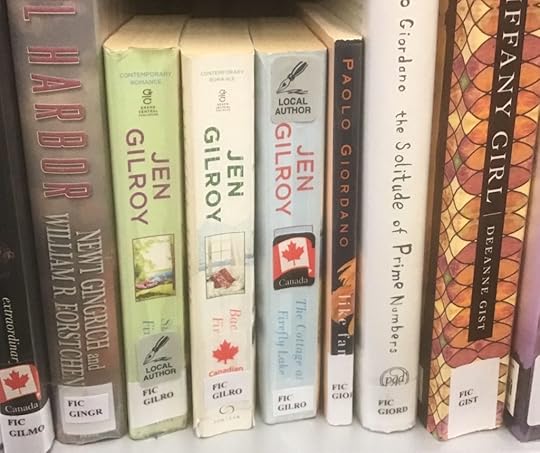 Libraries buy books (including mine) and seeing books I’ve written on library shelves helps me connect with new readers and is also a thrill that will never diminish.
Libraries buy books (including mine) and seeing books I’ve written on library shelves helps me connect with new readers and is also a thrill that will never diminish.
Not least, libraries (and especially inter-library loan) help with research material for my writing work.
Community
Libraries are often places that bring people together for things far beyond books and reading.
By hosting special events and offering a space for community groups to meet (welcoming knitters, quilters, jig saw puzzle enthusiasts and others), libraries are often vibrant community spaces.
During this time of lockdown, my library has continued its community outreach by offering virtual story times, author readings, social media updates and even boosting their WiFi signal so that those without home Internet can connect from the car park.
A new normal
Whilst the library has been closed, I’ve had to get my “fix” from borrowing e-books and following activities online.
In the past week, though, libraries here have re-opened for curbside pickup, something that would have been unthinkable only a few months ago.
After placing an online hold on a title, I had a call from the library advising me of my designated pickup time with instructions to drive into the car park, reverse into an allocated parking space, alert staff that I’d arrived and open the trunk (boot) of my car.
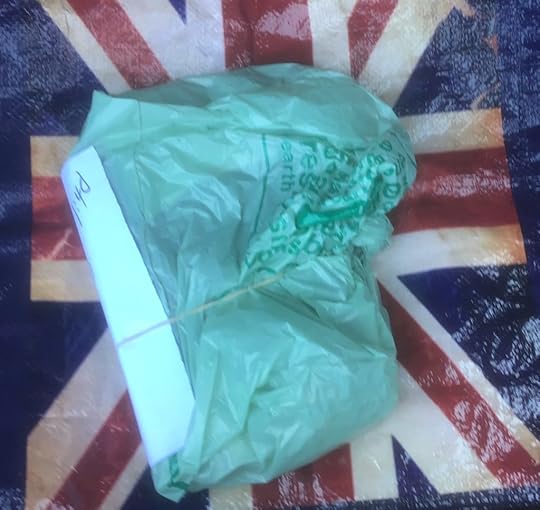 A librarian wearing a mask and gloves then placed the book (in a plastic carrier bag) in my car trunk.
A librarian wearing a mask and gloves then placed the book (in a plastic carrier bag) in my car trunk.
Although I miss what libraries used to be, I’m very grateful for how they’re evolving in our pandemic world, in particular the work staff are doing behind the scenes to help patrons access books and other materials and maintain some semblance of “normal” life.
As for the masked and gloved librarian?
Although we couldn’t chat like we’d usually do, her friendly wave and the twinkle in her eyes meant as much as the book I’d requested—and reminded me that we’re all in this situation together and getting through it as best we can.
May 14, 2020
Walking my way through lockdown
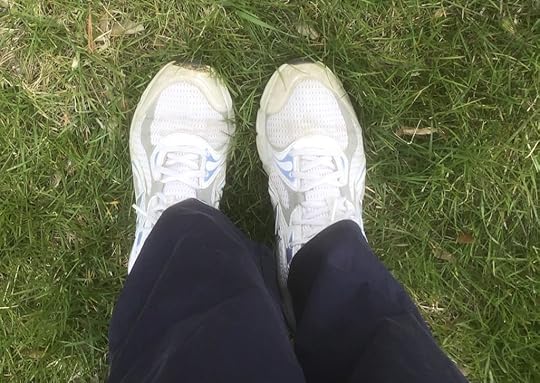
Like many of you, and although certain restrictions have eased a bit, I live in an area where we’re still sheltering in place and ‘normal life’ remains in almost complete lockdown.
As such, and with gyms, my dance studio and other fitness facilities closed, walking is even more of a lifeline for me than usual.
Together with improved physical and mental health, my daily walk (whether with Floppy Ears or alone) often gives me life lessons too.
Creative thinking
With Tech Guy working in my home office space and English Rose doing online school throughout the house, I currently write at a desk in the living room—in the middle of the main family traffic flow.
As the lines between my wife, mom and writing lives blur, going for a walk is one of the few times during the day when I’m not interrupted and can let my mind wander in a way introverted me craves.
From resolving plot problems to generating new story ideas or simply letting my thoughts drift, my walk is a precious time for self-care and creative thinking.
An antidote to pandemic snacking—burning calories
Although I do some ballet exercises at home, they don’t give me the same kind of work-out I get in the studio.
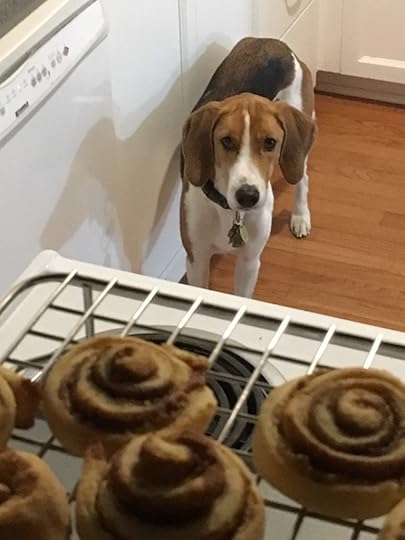 And with Tech Guy cooking gourmet meals, English Rose baking several times a week, and working at a desk that’s in view of the refrigerator, it’s all too easy for me to ‘eat’ the days away.
And with Tech Guy cooking gourmet meals, English Rose baking several times a week, and working at a desk that’s in view of the refrigerator, it’s all too easy for me to ‘eat’ the days away.
Along with practicing more willpower, brisk walking helps me keep snacking (and excess pounds) at bay.
Improved health and mood
Even before the current pandemic situation, walking helped alleviate my chronic back pain and, as an asthmatic, improve respiratory function.
While that’s still the case, now more than ever walking outdoors also lifts my mood, helps me recharge mentally and emotionally and gives me increased energy, especially mid-afternoon, usually the ‘low ebb’ of my day.
Exploring my neighbourhood
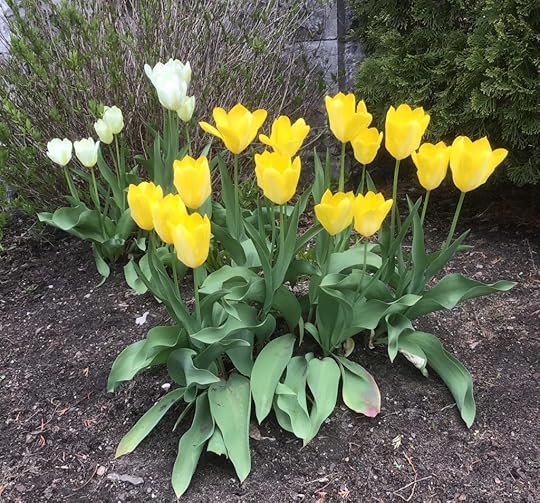 Not least, I’ve got to know my small town better in these past weeks than in the almost five years we’ve lived here.
Not least, I’ve got to know my small town better in these past weeks than in the almost five years we’ve lived here.
Unable to chat with neighbours (except at a distance), I’ve paid more attention to gardens, public green spaces and even churchyards, delving into the history of my community from the days of early settlers until now.
And at this particularly difficult time, it’s in those churchyards that I’ve found both comfort and a sense of continuity in the example of past lives lived.
Life lessons
Until March, I’d never ventured inside one of the cemeteries within easy walking distance of my home. Now, however, it’s an ideal place to social distance, and as I read the inscriptions on tombstones from the nineteenth century (old by Canadian standards) to the present day, I’m reminded that life has never been without challenges.
Along with getting a character name for a future book from the grave of a woman born in 1880 (my writer’s brain never truly switches off), these cemetery walks have also made me think about how short life is and to truly value and ‘live’ the time I’ve still got.
And like the man whose epitaph is “Lived–Trucked–Worked–Loved Forever,” life is indeed about the simple things—a useful adage when life as many of us know it is still turned upside down.
Happy walking to all of you who are also fans of this easy to start and low impact, although often underrated, form of exercise.
April 30, 2020
Reading (& Writing) for Hope, Comfort and Happy Ever After, plus a 0.99 deal on my latest book
Hello everyone,
This week, I’ve written a guest post for Women Writers, Women’s Books (WWWB) about ‘Reading (and Writing) for Hope, Comfort and Happy Ever After.’
Especially at this time of global pandemic, I’m sharing the importance of ‘comfort reading’ and why I think books with happy endings are more essential than ever. Read my guest post here.
After all, “when I can’t get (or give) many actual hugs, book hugs are next best. And unlike comfort chocolate, they’re also calorie free so I don’t have to walk them off on my limited forays outside the house!”
Sale on The Wishing Tree in Irish Falls
I also want to let you know that for those in the US and UK, the Amazon Kindle edition of The Wishing Tree in Irish Falls is on sale for 0.99 for three days only—Thursday, 30 April through to Saturday, 2 May 2020.
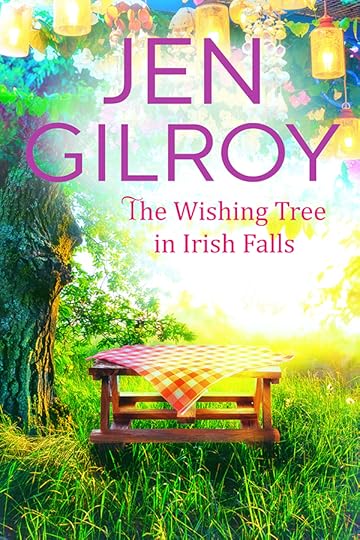 If you’re looking for a reading distraction, or want to give one to a friend, it’s a cozy, heartwarming story about family, community and second chances in life, as well as love.
If you’re looking for a reading distraction, or want to give one to a friend, it’s a cozy, heartwarming story about family, community and second chances in life, as well as love.
Buy The Wishing Tree in Irish Falls:
I’m thinking of all of you and hope you’re staying safe and well at what continues to be a very difficult and uncertain time.
Hugs,
Jen
April 16, 2020
Looking to the past to cope with the present
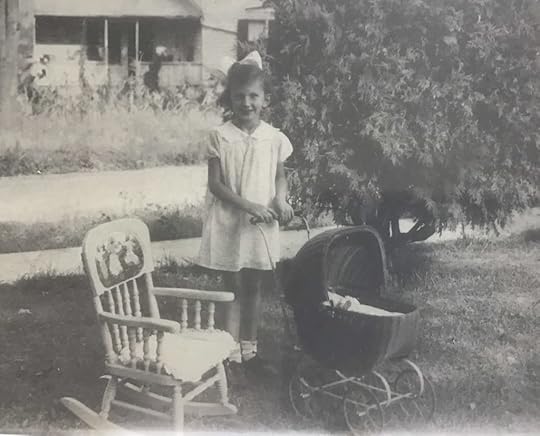 As life continues to be unsettled, I’ve thought about my late mother even more than usual recently and, in particular, how she coped during rough times.
As life continues to be unsettled, I’ve thought about my late mother even more than usual recently and, in particular, how she coped during rough times.
Both practical and pragmatic, when life was difficult Mom turned to baking or knitting. If she could give the results of those activities to comfort or help someone who might benefit from a batch of homemade muffins or pair of mittens, so much the better.
In part shaped by a childhood where she often had to do without, doing for others was her primary way of coping with uncertainty.
And when she needed the kind of ‘alone time’ I’m currently craving after weeks of ‘mandated family togetherness’? She worked outside, in her garden in summer or clearing snow in winter—physical activity and fresh air being her go-to recommendations to boost physical and mental health.
Although I’m like my mother in some ways (introversion and a love of reading are perhaps the most obvious), I’m also much different from her in others.
The crafting gene missed me (that one went to English Rose), and although I enjoy baking, it’s not a passion or creative outlet in the way it was for my mom. Owing to chronic back pain, I’ve also never found solace in digging, whether snowdrifts or spring earth.
Yet, although the specifics differ, I’ve realized that some of my coping mechanisms for stressful situations are similar to those my mother used—if not in practice then principle.
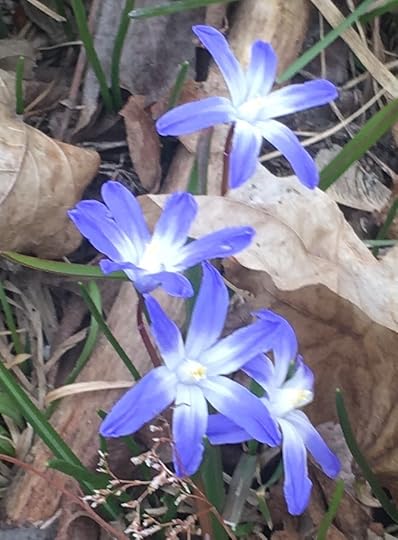 In the past weeks, and to get that ‘me time’ I crave, walking in my neighbourhood has helped clear my mental cobwebs, focus on small joys and return home refreshed and happier in both mind and body—giving me new perspectives on worries too.
In the past weeks, and to get that ‘me time’ I crave, walking in my neighbourhood has helped clear my mental cobwebs, focus on small joys and return home refreshed and happier in both mind and body—giving me new perspectives on worries too.
During this time of lockdown, and within the constraints of being an asthmatic living with a medically vulnerable teen, I’m also asking (and like my mom would have), ‘how can I help?’
At present, I’m working with an older friend on a community cookbook featuring vintage recipes from the local area.
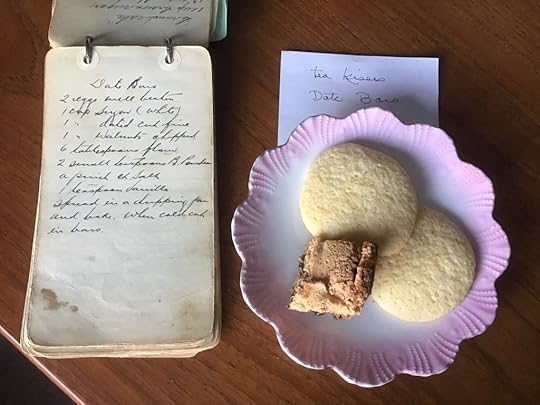 Although not testing recipes, I’m applying my writing and editing skills to review the text and help make sure it will be understood by contemporary cooks.
Although not testing recipes, I’m applying my writing and editing skills to review the text and help make sure it will be understood by contemporary cooks.
As such, and via email and telephone (given social distancing), I’m helping someone who needs support and, in a small way, contributing to a broader community good.
As for other ways of coping?
I’m continuing to find solace in reading, my closets and cupboards have never been so tidy and (much to my surprise), I’ve finished the first draft of a new book in what is for me record time. I’m also lowering my expectations, though, recognizing that life isn’t ‘normal’ and like everyone else, I can’t expect to function in ways I usually do.
Most important of all, though, given the current state of the world and what so many others are having to cope with, I continue to remind myself that I’m lucky. All I have to do is stay at home and thereby keep myself and others safe.
Always a strong advocate of following public health advice, not only would Mom approve but, and as she often said, ‘this too shall pass.’
In the meantime, though, there’s still the basement cupboards to tackle and those boxes of family photos to organize…
April 3, 2020
Life and writing in lockdown
When this is all over…
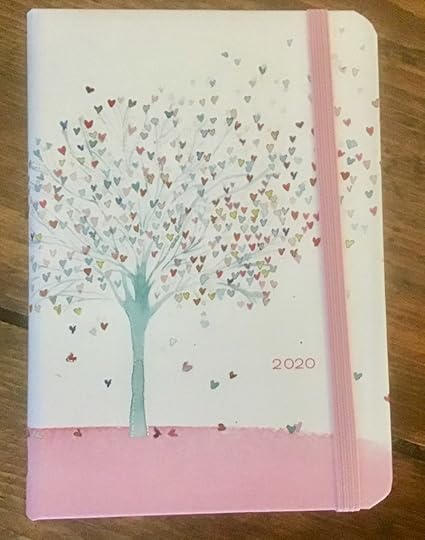 I hear that phrase often these days as everyone, me included, wants life in 2020 to go back to ‘normal’ as soon as possible, whatever that ‘new normal’ will be.
I hear that phrase often these days as everyone, me included, wants life in 2020 to go back to ‘normal’ as soon as possible, whatever that ‘new normal’ will be.
For the moment, though, life (and for me, writing), have to go on in lockdown.
As such, I’m finding new ways to adapt and cope and be grateful for what I have instead of lamenting what I don’t.
Family life with Tech Guy
As many of you know, Tech Guy usually works five hours away from home from Monday to Thursday. As such, our family life is typically squeezed into Friday, Saturday and Sunday morning before he has to leave again on Sunday afternoon.
For us, the silver lining in the dark Covid-19 pandemic cloud is not only that Tech Guy still has a job (and I give thanks for that on a daily basis), but he’s also working from home for the foreseeable future.
Both as a family and couple, we have more time together than we’ve had in years and from walks with Floppy Ears to movie nights, cleaning up the kitchen together and more, life is settling into a new and, in some ways, better rhythm.
Small joys
Now more than ever, I’m finding happiness in little things like sunshine and blue skies on an early spring day. 
I’m also relishing opportunities to try new things.
While online yoga isn’t for me (not least because Floppy Ears is keen to adopt the ‘downward dog’ pose too), thanks to live streaming by galleries and zoos, I’m learning more about art and animal care.
And a few weeks ago, I’d never have guessed I’d be enjoying some of the best in British theatre and dance from my sofa in small-town Canada.
Much like my grandparents who lived through the Second World War, I’m also learning to ‘make do and mend.’
This week, I pulled out my dusty sewing box and, with help from Google, successfully mended a torn comforter, all the while hearing the echo of my late mom’s voice telling me that one day I’d regret not learning the finer points of darning.
Writing the words
 Since writing is my job, I have to make space and time to write the words too, despite and for almost the first time in my writing life, finding it difficult to concentrate on my fictional world.
Since writing is my job, I have to make space and time to write the words too, despite and for almost the first time in my writing life, finding it difficult to concentrate on my fictional world.
Apart from the constant news cycle, I’m dealing with almost constant familial interruptions, as well as the worry of what writing and publishing will look like in the future.
Also, and as someone who writes primarily contemporary fiction, I’m grappling with questions about how or if to incorporate current events into new stories I tell.
In this difficult time for everyone, self-employed creatives have particular challenges but for me, going back to basics, and where I started from as a writer is helping more than anything.
Currently, I’m writing in short bursts of 250 to 500 words and aiming to write 1,000 words a day amidst and around other things.
As in many parts of my life, I can’t change my current writing reality so I’m adapting to it as best I can.
And for the writers who read my blog, I’m using novelist Julie Cohen’s ‘work hat’ (mentioned in this excellent ‘lockdown survival guide’) to ‘train’ my family that even though it might not look like it, I am actually working and should only be interrupted for blood, broken bones, flood, fire or some comparable emergency.
And when this is all over?
I’ll never again taken for granted…
A hug from a friend and chatting with a neighbour.
Going to a café to linger over tea and cake and choosing items from a well-stocked grocery shelf.
Being able to travel in real life instead of via a screen.
Visiting the library to borrow physical books and access inter-library loan.
Not having to sterilize everything that comes into my house because of fear of infecting my chronically ill daughter.
The work that teachers, doctors, nurses, grocery store staff, delivery drivers and others do to sustain our communities, countries and so many aspects of our lives.
And not least, my home and family and how blessed I am that both are a sanctuary when I need them.
Take good care of yourselves, friends, and at a time when for many of us, reading has never been more important, I hope you’re finding stories that comfort, inspire and give you hope.
In a small way, that’s the kind of stories I write and, at times of doubt, it’s for readers like you that I do what I do—and build books in those 250 word increments.
A note about The Wishing Tree in Irish Falls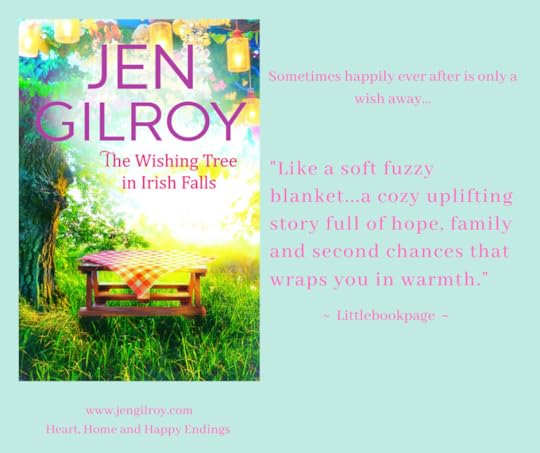
If you’ve been waiting for the paperback edition of The Wishing Tree in Irish Falls, it’s out on April 12, 2020.
Given the global health crisis and related (rightly so) prioritization of shipping essential items, paperback deliveries may be delayed. However, if you’d like a paperback, I hope you’ll still order one and understand why it may take longer to arrive.
The e-book is available, though (and FREE in Kindle Unlimited), so if you haven’t read it and would like a cozy, comforting and romantic read, I hope you’ll give The Wishing Tree in Irish Falls a try.
BUY LINKS
Both the paperback and Kindle editions are available on all Amazon platforms including:
Amazon US
Amazon UK
Amazon Canada
The paperback of The Wishing Tree in Irish Falls is also available at:
Barnes & Noble
The Book Depository (free shipping worldwide)
March 19, 2020
Staying apart but joining together: The rise of ‘caremongering’
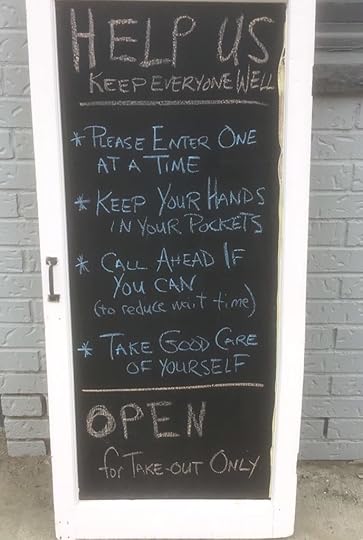
With the rapid spread of the Covid-19 pandemic, in only a few weeks life as we know it has changed almost beyond recognition—and in ways unprecedented in my lifetime—so we’re all adapting to a new normal.
Yet, as I stay apart from others (and social distancing is one of the many new expressions I’ve learned in recent days), I also see people joining together in ways that speak to the essential human goodness I try to capture through the characters and communities I write about.
Staying apart
Here in the Rideau Valley (and as part of a state of emergency in the Canadian province of Ontario), schools are closed, arts activities cancelled or postponed, libraries and museums are shut and many local business have temporarily had to close up shop.
 When I walk Floppy Ears, I wave and talk to others from a distance. Since my sociable hound can’t understand why we don’t visit as we usually would, much harness tugging and howling ensues when we spot a human or canine friend.
When I walk Floppy Ears, I wave and talk to others from a distance. Since my sociable hound can’t understand why we don’t visit as we usually would, much harness tugging and howling ensues when we spot a human or canine friend.
Sunday church is now a live stream via the church’s Facebook page, my ballet class has ceased due to the studio’s closure, and when I had to go to the bank this week, I used hand sanitizer (provided on a table near the door) no fewer than three times.
Tech Guy’s company has mandated that employees work from home for the foreseeable future and so together with English Rose, our little family is hunkered down for the ‘duration’—however long that may be.
As an introvert and writer, I’m used to being alone and work from home as a matter of course. However, having everyone else here, all the time, will take adjustment and necessitate a new routine, mutual accommodation and, in particular, a sense of humour.
Joining together
In this past week, though, and despite the anxiety we’re all feeling (amplified for me because English Rose has underlying medical conditions and Tech Guy’s mother is unwell in a care home), I’m heartened by how people and communities are joining together to support each other in new and important ways.
I’m now part of several Facebook groups that have been organized in my area to share practical tips, local business updates and to combat isolation through laughter and emotional support.
A local artist is offering free virtual art classes. There are numerous resources for parents who have been catapulted into home schooling whilst also trying to work from home. A coffee shop is offering free delivery to those who are housebound, and a grocery store now has an exclusive early opening for ‘senior shopping.’
People able to do so have volunteered to shop for and help those in need, and my choir director has started an email check-in to share bits of news and keep us connected virtually when not in song.
Along with jokes and funny memes, as a community we’re getting through, hour by hour and day by day.
This kind of community caring is a phenomenon the BBC picked up on this week, describing it as ‘caremongering’—an antidote to the ‘scaremongering’ that often happens during crisis situations.
Not unique to Canada, ‘caremongering’ will make us all stronger once this crisis ends.
Counting my blessings and making do
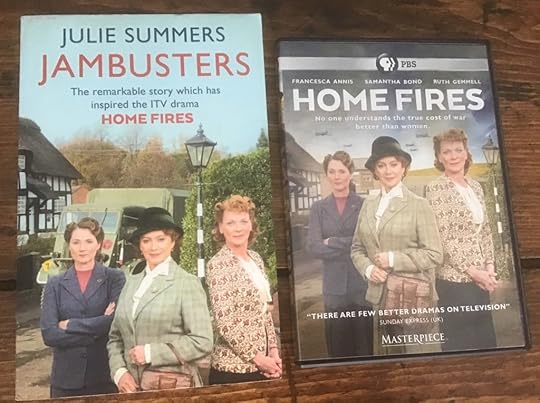 Not least, and while evoking that British ‘Blitz spirit’ I’ve read about and seen depicted in so many accounts of the Second World War, this time is also a chance for me to focus on what truly matters in life and be grateful for my many blessings.
Not least, and while evoking that British ‘Blitz spirit’ I’ve read about and seen depicted in so many accounts of the Second World War, this time is also a chance for me to focus on what truly matters in life and be grateful for my many blessings.
Take good care, my friends, and from my home and family to you and yours, I send warm wishes for comfort, safety and good health as we navigate this anxious time together.
On a lighter note, although I did a bit of ‘panic borrowing’ before my local library closed, as a lifelong reader I’ve never been more grateful for my well-stocked bookshelves, both physical and electronic.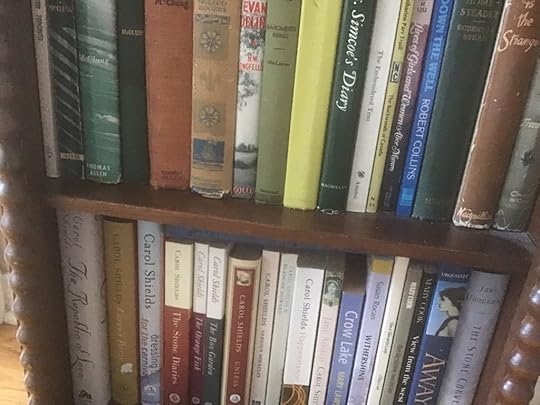
Sheltering in isolation is one thing, but without books to take me to other places in my imagination? Unthinkable!
And when I’m not reading (and writing), I’m doing ballet plié’s holding onto the kitchen counter and singing as I wash my hands!
March 5, 2020
Celebrating women who have gone before
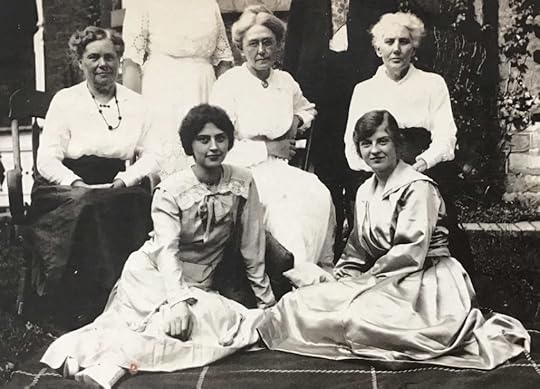
To mark women’s history month (celebrated in March in the United States and UK), I’m this month’s featured author on my friend Mel Greenberg’s ‘Notes from the Nest’ blog.
I’ve written a personal piece about what ‘women who have gone before’ mean in my own life, and how their example has helped me become the person—and writer—I am today.
Whether you’re celebrating women’s history month this March or not, I hope you’re inspired to think about and honour inspirational women who have shaped your own life. Read my special guest post here.
Meet Mel Greenberg
I met Mel at the Women’s Fiction Writers Association (WFWA) Retreat in Albuquerque, New Mexico in September 2019. We’ve since become good friends so I was thrilled when she asked me to feature on her blog.
Like me, Mel is a mom, wife and writer. And as I learn more about her life journey (including as a breast cancer survivor), she continues to inspire me with her positivity, courage and now, with an empty nest, how she’s creating a new life beyond children.
Find out more about Mel in this interview with SDVoyager, an online magazine from San Diego, California.
Writing news—Paperback of The Wishing Tree in Irish Falls is now available for pre-order
For those of you waiting for the paperback edition of The Wishing Tree in Irish Falls, it will be out on April 12, 2020 and is now available for pre-order:
Amazon US / Amazon UK / Amazon Canada / Barnes & Noble
Library copies of The Wishing Tree in Irish Falls
If you’ve suggested that your library purchase a copy of The Wishing Tree in Irish Falls (if so, I’m very grateful), please tell your librarian that my new book is available on Ingram or, depending on the library’s acquisitions system it can, of course, be purchased from Amazon directly.
February 20, 2020
Falling down, getting up and moving forward

Several weeks ago, while walking in my small town I slipped and fell on a patch of ice that lurked under a blanket of fresh snow.
Since three generations of women in my mother’s family broke their hips, one when she was not much older me, that ‘legacy’ flashed across my mind as my feet went out from under me and I landed flat on my back by a snowdrift, winded both from the fall and terror of what might be.
However, during often-brutal Canadian winters, I rarely set foot outdoors without several layers of clothing. On that occasion, I had long underwear beneath my trousers, thermal boots extending to mid-calf, a vest, long-sleeve top, fleece jacket, parka (with hood), two pairs of wool mittens, scarf and knitted hat.
When I hit the ground, all that padding cushioned my fall and (thankfully) I ended up with only minor bruising, no head injury or broken bones.
Yet, as I brushed snow off my clothing and walked home four blocks, it struck me that falling down and getting up again to move forward despite fear, has been a constant in both my life and writing.
Life traumas
This February marks the eighth anniversary of my mother’s death—a loss that was tragic, shocking and an experience that despite learning to live with, I’ll never truly get over.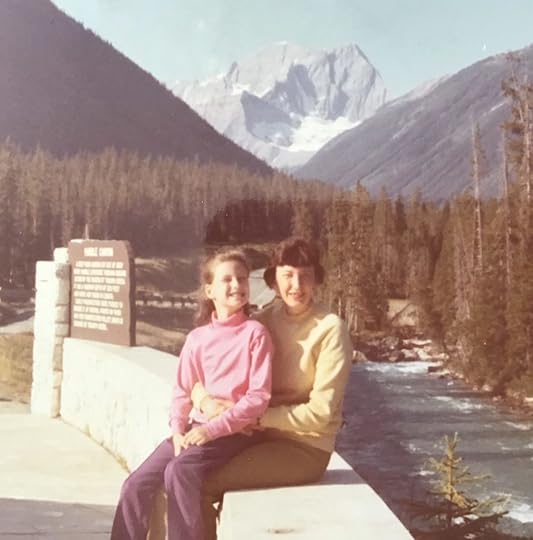
It also marks the fourth anniversary of when my previously healthy daughter became chronically ill and everything I took for granted about my life and family turned upside down.
And yet, in the wake of events that, much like that recent fall came out of nowhere to flatten me, I had to get up and find ways beyond the shock and fear to somehow move forward, even though everything is now much different than it once was.
Writing lows
In recent years, I’ve had numerous tumbles in my writing life too and, at the time, some of those also (temporarily) flattened me and created a different kind of fear.
Yet, because I still have stories to tell and readers I care about and don’t want to disappoint, I picked myself up, thought about what I’d learned and, a little bit wiser—albeit a lot more bruised—went back to my desk to write despite things that scare me.
Besides, as author Julie Cohen wrote in a recent post, “Failure: The Writer’s Best Friend” (a must-read essay if you’re also a writer):
“…it’s the failure that gets you to the solution…failure is inevitable and completely normal. It means that things are going the way they’re supposed to. And that for most failures, the only remedy is to keep on going…”
New words to live by
If you’re a regular reader of my blog, you may remember that this January I hadn’t yet chosen a word for 2020.
As January slid into February, I wrote lots of words (I have three books in progress at different stages at present), but I couldn’t find one that spoke to me at the level needed to help guide my life over the coming months.
Yet, when I gingerly levered myself up from my fall, all of a sudden, my word—or rather, words—were there.
The first is resilience, the ability to recover from difficult situations.
Resilience is something I draw on daily both as a writer facing difficulties large and small, and also mum of a teen with increasing complex medical needs (so complex our local children’s hospital doesn’t test for or treat some of the conditions she may now have).
I’m still fearful, but I’m choosing resilience despite trepidation.
The second is transition, changing from one condition to another.
Again, and as both mum and writer, I’m in a state of transition too, and despite anxiety about what may lie ahead, I’m adapting to manage what is (changes in my daughter’s health and in book publishing), not what once was or I might like it to be.
And when it comes to my family history and that legacy of broken hips?
 If you’ve read The Wishing Tree in Irish Falls (and for those of you waiting for the paperback, that edition will be out in April), you may remember that Maureen, the heroine, Annie’s mother, had her own broken hip.
If you’ve read The Wishing Tree in Irish Falls (and for those of you waiting for the paperback, that edition will be out in April), you may remember that Maureen, the heroine, Annie’s mother, had her own broken hip.
As Maureen tells Annie:
“I slipped on a sidewalk I’ve walked on since I was a child. One minute I was in front of the church thinking about trying a new meatloaf recipe, and the next I was flat on my back convinced I was about to meet my maker.”
Maureen’s experience is drawn from that of my grandmother who also broke her hip when she slipped on a familiar sidewalk outside a church not far from where I now live.
For me, life and fiction are intertwined and even something like a fall can hold both story nuggets and life lessons.
Besides, in the snowy depths of a Canadian winter when spring seems far away, I’m searching for positivity in even the most unlikely situations!
February 6, 2020
Meet guest author Anita Kushwaha & celebrate her new book, Secret Lives of Mothers & Daughters

I don’t often host guest authors on my blog, but this week I’m happy to be celebrating with a dear author friend, Anita Kushwaha, whose new women’s fiction novel, Secret Lives of Mothers & Daughters is now out in Canada before releasing on February 18th in the US, UK, Australia & New Zealand.
Like me, Anita is Canadian and we live near each other in Eastern Ontario.
After meeting on social media via the Women’s Fiction Writers Association, we’ve discovered we have much in common including attending the same university and studying in the same department.
We share a British connection too as Anita’s husband is from England where I lived for many years.
I’ve brewed a pot of tea and have a plate of butter tarts, a favourite Canadian treat, to chat with Anita about her life, writing and new book which is now on my Kindle and next on my to-read list.
Tell us a little about yourself.
I’m a recovering academic whose former life involved conducting social and environmental research in the eastern Canadian Arctic.
I love reading, running, baking and napping with my cat, Noodles. I met my husband hiking the Inca Trail some fifteen years ago.
I’ve wanted to be a writer since I was a child, but it wasn’t until I met my husband, who showed infinite faith in me, that I started believing I should take a chance and go for it. The saying about how the faith of one person can change your life rings true.
As you know, I’m a cat lover too and enjoy seeing pictures of sweet Noodles. We also share that childhood dream of becoming a writer.
What’s the premise of your new book
, Secret Lives of Mothers & Daughters?
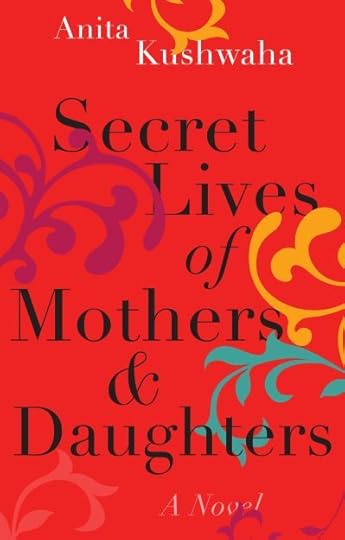
Secret Lives of Mothers & Daughters is a mother-daughter story told in alternating timelines, that of Asha and Mala.
The story begins with the revelation that Asha’s parents have kept the truth about her adoption a secret for her entire life. But why?
As Asha is thrust on a journey of self-discovery, the reader is introduced to Mala, and the choices and secrets that end up shaping both their lives.
More broadly, the book is about the ties that bind mothers and daughters together, and the secrets that tear them apart.
I’m fascinated by the complexity of mother-daughter relationships, for instance, why we place such high expectations on each other and the cost of those expectations. My characters often grapple with the pressure of being “good daughters,” which can make living authentically a challenge as they try their best to fulfill that role.
I hope the book sparks conversations around choice, the importance of living in accordance with one’s inner truth, and women’s mental health.
Those mother-daughter relationships fascinate me too. I think many women, me included, can relate to that “pressure of being good daughters” whilst also trying to be true ourselves.
Secret Lives of Mothers & Daughters also sounds like an excellent book club read and I’ll be happy to recommend it to my club as a title for us to consider.
What inspired you to write it?
I knew I would write a book having to do with arranged marriage someday because growing up in a small town, it was one of the characteristics that distinguished the origins of my family from that of those around me, and was often misunderstood, which at times became a source of shame for me and made me feel like our family was somehow less authentic than those around us.
In writing the book, I wanted to explore the idea that all relationships, regardless of their origins, are arrangements of one sort or another, with their own particular advantages and disadvantages, freedoms and constraints.
The other themes that I wanted to explore in the book are those that seem to make their way into my writing—immigrant experiences, intergenerational conflict, the consequences of silence, identity, belonging, and mental health examined through a cultural lens.
I also knew I’d write a tragic love story someday, and wanted to give a nod to my love of Victorian novels, especially the works of the Brontes, hence the influence of Jane Eyre in the book, which also speaks to another subtle theme, that is, the ability of fiction to connect people through time.
For me, your voice, that of a woman from an immigrant family, makes an important contribution to Canadian literature, as well women’s fiction and diverse (#ownvoices) books more generally.
And how interesting that this story was also influenced by Victorian novels and Jane Eyre in particular. As another fan of Victorian fiction, I’ll keep that connection in mind as I read.
What authors do you admire and/or have influenced your development as a writer? Please feel free to add specific books, my readers and I love recommendations!
I read widely across genres, and many authors have influenced me, but I’ll mention a few key ones here.
I grew up in a small town in the Canadian province of Quebec, raised on books that didn’t reflect me or the experiences of my immigrant family. The consequence was that it limited what I thought I could be, and which stories mattered.
When I was nineteen or twenty, I read “Interpreter of Maladies” by Jhumpa Lahiri. That collection of short stories changed everything for me. I’ll never forget the nuances of South Asian family life in those stories, some of which brought tears to my eyes, because finally it was there, it was seen.
I started to believe that not only could I write from my perspective, but there might also be someone out there willing to read what I had to offer, someone who might need the stories as much as I did back then, and always will. I suppose that’s why writing for me is an act of place-making. You can carve out a place for yourself with a book. You can inject your voice where it was previously dismissed, minimized, ignored.
I call Margaret Atwood my High Priestess – reading her has always felt like taking a masterclass to me. When I read her work, I need to have a notebook beside me, because her creativity sparks creativity in me. She also reminds me write bravely.
I’ve recently completed Elena Ferrante’s Neapolitan Quartet and was blown away by her mastery at weaving together the personal and political. Her work has deeply influenced my current WIP.
I also grew up reading a lot of Victorian femlit and love the Brontes. Hence the nod to Jane Eyre in Secret Lives of Mothers & Daughters.
Some books I’ve read within the past few years that I thought were brilliant are: All The Light We Cannot See by Anthony Doerr, A Little Life by Hanya Yanagihara, The Nightingale by Kristin Hannah, Swing Time by Zadie Smith, Washington Black by Esi Edugyan, Eleanor Oliphant is Completely Fine by Gail Honeyman, Home Fire by Kamila Shamsie, The Power by Naomi Alderman, Dual Citizens by Alix Ohlin, Motherhood by Sheila Heti.
Auto-buy authors for me would be Zadie Smith, Jhumpa Lahiri, Margaret Atwood, Esi Edugyan, Elena Ferrante, Kamila Shamsie—I always want to know what these writers are thinking about and have to say.
Thank you for sharing those aspects of your experience as a reader and writer with us.
I’m especially struck by what you said about “writing…is an act of place-making” for you. That’s so important and speaks to the need for more diverse fiction and voices to help us all “see” and understand those who have been “dismissed, minimized [and] ignored.”
As a reader, I love books that take me out of my own experience and help me see the world and people in new ways and your stories are part of that.
Thank you for those book recommendations too. Some are already on my shelves (and I’m especially happy for that shout-out to Canadian author Margaret Atwood), but you’ve added others to my TBR list!
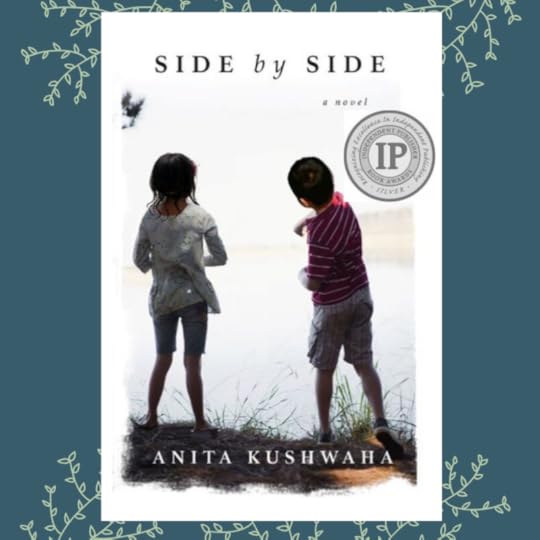 And echoing something you said earlier, as one of your readers, I’m very glad your husband encouraged you to “take a chance” on writing and tell your own stories.
And echoing something you said earlier, as one of your readers, I’m very glad your husband encouraged you to “take a chance” on writing and tell your own stories.
Your previous book, Side by Side (an IPPY Award Silver Medalist for Multicultural Fiction) was one of the most emotionally gripping books I read last year.
What are you working on now?
I’m currently working on a sisterhood story, more bitter than sweet, inspired by The Blind Assassin by Margaret Atwood and Elena Ferrante’s Neapolitan novels. Lots of complex family dynamics and secrets, also in keeping in with my interest in exploring issues of identity, belonging, immigrant experiences, and the lives of South Asian women.
What excites me about the project is having another opportunity to explore the complexity of female relationships and family life. Endlessly fascinating topics to me.
As both a reader and writer, they’re “endlessly fascinating topics to me” too, Anita, and I’m looking forward to read your “sisterhood story” in due course.
Thank you so much for joining me to chat about your life and new book. I wish you much success with Secret Lives of Mothers & Daughters.
I’m also happy that you’re a part of my life and writing journey.
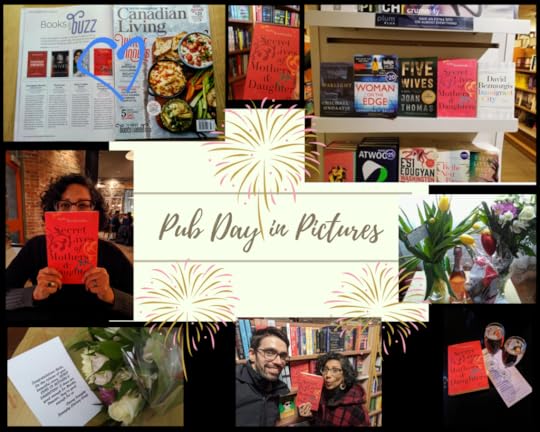
Release dates for Secret Lives of Mothers & Daughters:
Canada: January 28th, 2020 / US, UK, AUS, NZ: February 18th, 2020
Synopsis
For readers of Shilpi Somaya Gowda’s “Secret Daughter” and Nancy Richler’s “The Imposter Bride”, a breathtaking novel from Anita Kushwaha about the ties that bind mothers and daughters together and the secrets that tear them apart.
Veena, Mala and Nandini are three very different women with something in common. Out of love, each bears a secret that will haunt her life—and that of her daughter—when the risk of telling the truth is too great. But secrets have consequences. Particularly to Asha, the young woman on the cusp of adulthood who links them together.
On the day after her eighteenth birthday, Asha is devastated to learn that she was adopted as a baby. What’s more, her birth mother died of a mysterious illness shortly before then, leaving Asha with only a letter.
Nandini, Asha’s adoptive mother, has always feared the truth would come between them.
Veena, a recent widow, worries about her daughter Mala’s future. The shock of her husband’s sudden death leaves her shaken and convinces her that the only way to keep her daughter safe is to secure her future.
Mala struggles to balance her dreams and ambition with her mother’s expectations. She must bear a secret, the burden of which threatens her very life.
Three mothers, bound by love, deceit and a young woman who connects them all. Secret Lives of Mothers & Daughters is an intergenerational novel about family, duty and the choices we make in the name of love.
Buy or pre-order a copy of Secret Lives of Mothers & Daughters:
Amazon.com
Amazon.ca
Amazon UK
Barnes & Noble
Chapters
Indie Bound
Find Anita on social media:
Goodreads
Twitter
Facebook
Instagram
Website
Publisher’s website: HarperCollins
January 23, 2020
Four things about “real me” that shape “author me”
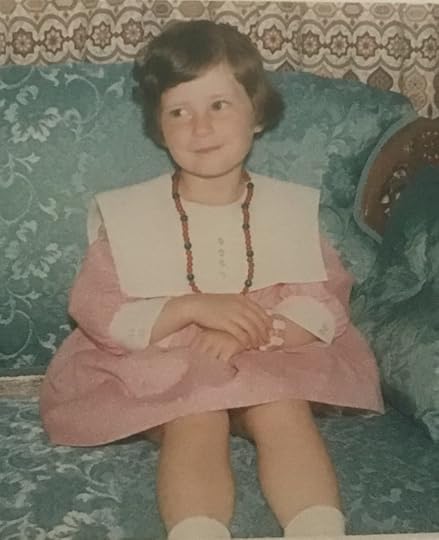
Every so often, I spot posts on social media asking people to share things about themselves that others may not know.
In the case of friends, it’s a fun exercise because even when I think I know someone well, I also usually learn something new about them.
And for an author or other public figure, it’s an interesting way of getting to know something about the “real person” behind the book or persona.
So, for those of you who know me in “real life” and those who only know “author me,” here are four things that shape who I am as a person and influence my writing as well.
A southpaw in a right-handed world
Until I started school, I didn’t think about being left-handed. Along with my brown hair and blue eyes, it was simply part of who I was and how I lived in my little world.
Yet, as someone who favours her left hand for everything except using scissors, school was my introduction to a way of being different that has persisted throughout my life.
The world is organized for right-handed people (next time you’re in a library check out all those public computer terminals with the mouse on the right-hand side), so as a ‘lefty’ I’ve had to adapt in ways large and small.
However, always having to think outside the box in a way that’s different to the ‘norm’ means I’m used to dealing with challenges—a helpful skill in many occupations including writing. It’s also made me more independent and better able to trust my intuition, especially in creative pursuits.
Languages
Like many English Canadians, my second language is French and I value how learning another language has helped me think, and understand the world and people, in new ways.
At one point in my career before writing, I worked in a bilingual office so grew accustomed to switching between English and French multiple times a day, often in the same group conversation.
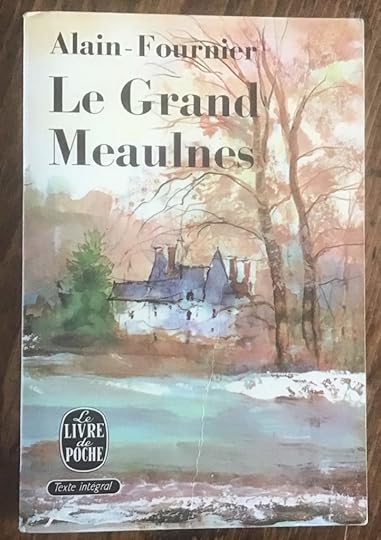 That linguistic nimbleness serves me well as a writer. It helps me to better get inside characters’ heads to see and experience what they do, and also gives me a sharp appreciation for subtle nuances of language and related character development.
That linguistic nimbleness serves me well as a writer. It helps me to better get inside characters’ heads to see and experience what they do, and also gives me a sharp appreciation for subtle nuances of language and related character development.
A life in music
I come from a musical family so learned to read music at the same time as I learned my letters.
Music is still an important part of my life and influences my writing, too. Not only do I make a playlist for each book, but my most recent release, The Wishing Tree in Irish Falls, has a musical theme and the hero and heroine share my own love of singing and making music.
Not least, and although trained in classical and church music, I have a particular affinity for country music.
Like fiction, country songs tell stories about how people live and experience the world. The best have a narrative arc that make them short stories in musical form which inspires me in many aspects of writing.
An only (but not lonely) childhood
Only children are much more common now, but in my childhood, I was an oddity.
Although I often longed for siblings (and indeed was drawn to Tech Guy in part because he’s one of a family of five children), my life as an only child helped make me a reader and writer.
Without sisters or brothers to play with, I usually had my nose in a book and also made up stories for myself from an early age. As a child, I shifted between real and imaginary worlds with ease and that’s something which is now crucial to my writing life.
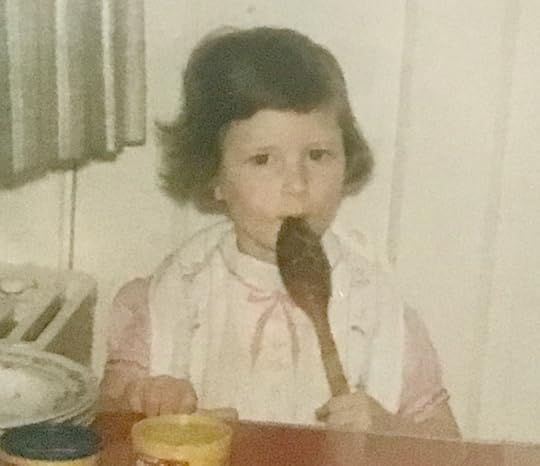 Many other things have undoubtedly shaped me as a person and a writer, but I hope you’ve enjoyed these highlights.
Many other things have undoubtedly shaped me as a person and a writer, but I hope you’ve enjoyed these highlights.
And to all the other left-handers out there—high five…with my left-hand, of course.



